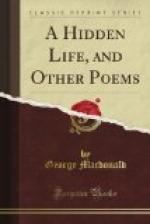For love of some one lost; for some old voice
Which first thou madest sing, and after sob;
Some heart thou foundest rich, and leftest bare,
Choking its well of faith with thy false deeds;
Not like thy God, who keeps the better wine
Until the last, and, if He giveth grief,
Giveth it first, and ends the tale with joy.
Madness is nearer God than thou: go mad,
And be ennobled far above thyself.
Her brain was ill, her heart was well: she loved.
It was the unbroken cord between the twain
That drew her ever to the ocean marge;
Though to her feverous phantasy, unfit,
’Mid the tumultuous brood of shapes distort,
To see one simple form, it was the fear
Of fixed destiny, unavoidable,
And not the longing for the well-known face,
That drew her, drew her to the urgent sea.
Better to die, better to rave for love,
Than to recover with sick sneering heart.
Or, if that thou art noble, in some hour,
Maddened with thoughts of that which could not be,
Thou mightst have yielded to the burning wind,
That swept in tempest through thy scorching brain,
And rushed into the thick cold night of the earth,
And clamoured to the waves and beat the rocks;
And never found the way back to the seat
Of conscious rule, and power to bear thy pain;
But God had made thee stronger to endure
For other ends, beyond thy present choice:
Wilt thou not own her story a fit theme
For poet’s tale? in her most frantic mood,
Not call the maniac sister, tenderly?
For she went mad for love and not for gold.
And in the faded form, whose eyes, like suns
Too fierce for freshness and for dewy bloom,
Have parched and paled the hues of tender spring,
Cannot thy love unmask a youthful shape
Deformed by tempests of the soul and sea,
Fit to remind thee of a story old
Which God has in his keeping—of thyself?
But God forgets not men because they sleep.
The darkness lasts all night and clears the eyes;
Then comes the morning and the joy of light.
O surely madness hideth not from Him;
Nor doth a soul cease to be beautiful
In His sight, when its beauty is withdrawn,
And hid by pale eclipse from human eyes.
Surely as snow is friendly to the spring,
A madness may be friendly to the soul,
And shield it from a more enduring loss,
From the ice-spears of a heart-reaching frost.
So, after years, the winter of her life,
Came the sure spring to her men had forgot,
Closing the rent links of the social chain,
And leaving her outside their charmed ring.
Into the chill wind and the howling night,
God sent out for her, and she entered in
Where there was no more sea. What messengers
Ran from the door of love-contented heaven,
To lead her towards the real ideal home?
The sea, her terror, and the wintry wind.




